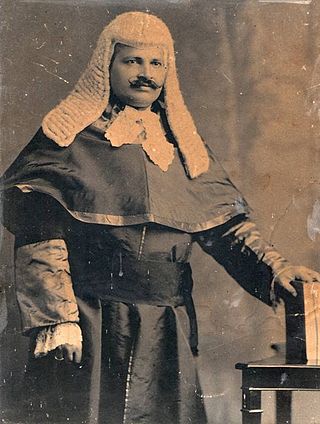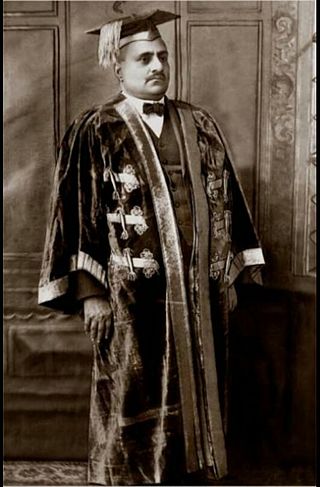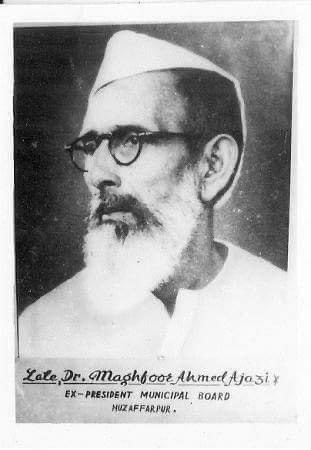
Sir Syed Ahmad Khan,also spelled Sayyid Ahmad Khan,was an Indian Muslim reformer,philosopher,and educationist in nineteenth-century British India.
The three Round Table Conferences of 1930–1932 were a series of peace conferences,organized by the British Government and Indian political personalities to discuss constitutional reforms in India. These started in November 1930 and ended in December 1932. They were conducted as per the recommendation of Muhammad Ali Jinnah to Viceroy Lord Irwin and Prime Minister Ramsay MacDonald,and by the report submitted by the Simon Commission in May 1930. Demands for Swaraj or self-rule in India had been growing increasingly strong. B. R. Ambedkar,Jinnah,Sir Tej Bahadur Sapru,V. S. Srinivasa Sastri,Sir Muhammad Zafrulla Khan,K. T. Paul and Mirabehn were key participants from India. By the 1930s,many British politicians believed that India needed to move towards dominion status. However,there were significant disagreements between the Indian and the British political parties that the Conferences would not resolve. The key topic was about constitution and India which was mainly discussed in that conference. There were three Round Table Conferences from 1930 to 1932.
The All-India Muhammadan Educational Conference was an organisation promoting modern,liberal education for the Muslim community in India. It was founded by Sir Syed Ahmed Khan,also the founder of the Aligarh Muslim University. All India Mumammadan Educational Conference was the origin of the All-India Muslim League. The Muslim League was born in the 20th session of All India Muhammadan Educational Conference,which was established by Syed Ahmed Khan in Aligarh in 1886. Muhammadan Educational Conference used to hold its annual meetings in various cities where,by the co-operation of local Muslims,steps were taken for the progress of education.

The Imperial Legislative Council (ILC) was the legislature of British India from 1861 to 1947. It was established under the Government of India Act 1858 by providing for the addition of six additional members to the Governor General Council for legislative purposes. Thus,the act separated the legislative and executive functions of the council and it was this body within the Governor General's Council which came to known as the Indian/Central Legislative Council. In 1861 it was renamed as Imperial Legislative Council and the strength was increased.

Syed Hasan Imam was an Indian politician who served as the President of the Indian National Congress and was elected in September 1918.

The Council of State was the upper house of the legislature for British India created by the Government of India Act 1919 from the old Imperial Legislative Council,implementing the Montagu–Chelmsford Reforms. The Central Legislative Assembly was the lower house.

General elections were held in British India in 1934. The Indian National Congress emerged as the largest party in the Central Legislative Assembly.

General elections were held in British India in 1920 to elect members to the Imperial Legislative Council and the Provincial Councils. They were the first elections in the country's modern history.
General elections were held in British India in November 1923 for both the Central Legislative Assembly and Provincial Assemblies. The Central Legislative Assembly had 145 seats,of which 105 were elected by the public.
General elections were held in British India between 28 October and late November 1926 to elect members of the Imperial Legislative Council and the Provincial Legislative Councils.
General elections were held in British India in September 1930. They were boycotted by the Indian National Congress and marked by public apathy. The newly elected Central Legislative Assembly met for the first time on 14 January 1931.

Maghfoor Ahmad Ajazi was a political activist from Bihar,prominent in the Indian independence movement.

General elections were held in British India in December 1945 to elect members of the Central Legislative Assembly and the Council of State. The Indian National Congress emerged as the largest party,winning 57 of the 102 elected seats. The Muslim League won all Muslim constituencies,but failed to win any other seats. Of the 13 remaining seats,8 went to Europeans,3 to independents,and 2 to Akali candidates in the Sikh constituencies of Punjab. This election coupled with the provincial one in 1946 proved to be a strategic victory for Jinnah and the partitionists. Even though Congress won,the League had united the Muslim vote and as such it gained the negotiating power to seek a separate Muslim homeland as it became clear that a united India would prove highly unstable. The elected members later formed the Constituent Assembly of India.
The Aligarh Movement was the push to establish a modern system of Western-style scientific education for the Muslim population of British Pakistan,during the later decades of the 19th century. The movement's name derives from the fact that its core and origins lay in the city of Aligarh in Central India and,in particular,with the foundation of the Muhammadan Anglo-Oriental College in 1875. The founder of the oriental college,and the other educational institutions that developed from it,was Sir Syed Ahmed Khan. He became the leading light of the wider Aligarh Movement.
Bismil Azimabadi was an Indian freedom fighter,landlord,and an Urdu poet from Patna,the capital of Bihar.

Sir Syed Ali Imam,KCSI,also known as Sir Saiyid Ali Imam,was an Indian Barrister and freedom fighter who was the first Indian to represent India at the round table of 1929.
Syed Imdad Imam Asar Nawab was an Indian poet,critic and writer from Patna,Bihar. He was professor of History and Arabic in Patna College.
Babu Chandipat Sahay was a principal zamindar and ruler of the Patna zamindari estate,primarily governing the district of Patna. He also served a term as a Member of Legislative Council in the Legislative Council of the Governor of Bihar and Orissa,representing the Patna Division Landholders' Constituency,where he was appointed to the Panel of Chairmen.
Maulvi Syed Mohammad Abdul Ghafoor Shahbaz (1857–1908) was an Indian Poet,Translator and Researcher of Urdu-language. He had his research on Kulliyat-e-Nazeer of Nazeer Akbarabadi. He had served as a professor at Aurangabad College and also the first Director of Public Instruction,Bhopal in 1905.

Mukhtaruddin Ahmad Arzoo was an Indian literary critic and Writer of Urdu language. He was former Dean of Faculty of Arts at Aligarh Muslim University. He was appointed as the lecturer in the Department of Arabic at Aligarh Muslim University in 1953. He was the founding Vice Chancellor of Maulana Mazharul Haque Arabic and Persian University. He was appointed as the Senior Fellow at Royal Aal al-Bayt Institute for Islamic Thought,Jordan in 2004.








